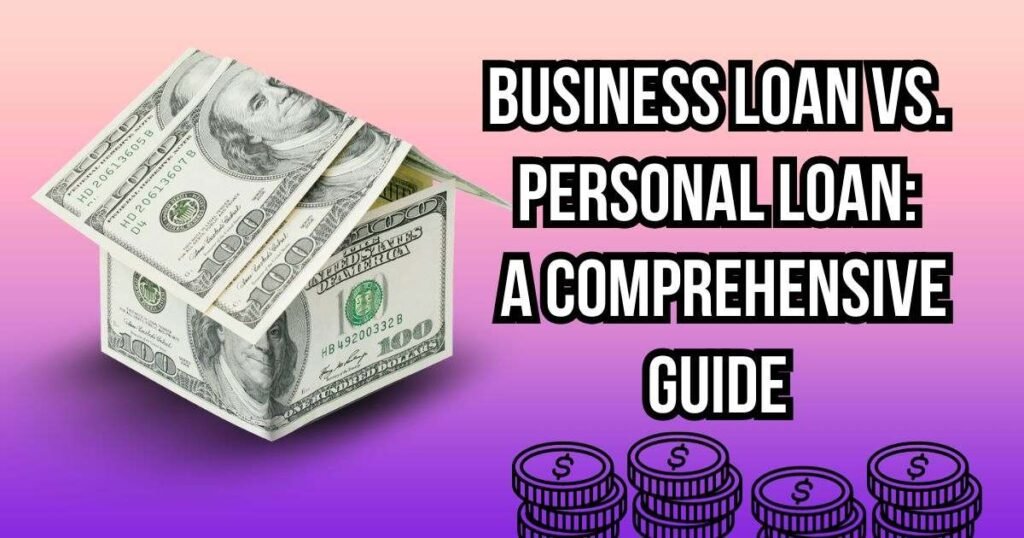Business Loan vs. Personal Loan, in the world of finance, understanding the nuances between different types of loans is crucial. Whether you're an entrepreneur looking to expand your business or an individual seeking funds for personal use, it's essential to know the differences between a business loan and a personal loan. This guide delves deep into the intricacies of both, helping you make an informed decision.
Understanding Business Loans

What is a Business Loan?
In the Business Loan vs. Personal Loan, a business loan is specifically designed to meet the financial needs of a business. Whether it's for purchasing equipment, hiring staff, or covering operational costs, business loans cater to the diverse requirements of a company. They can be both secured (requiring collateral) or unsecured.
Key Features of Business Loans:
- Purpose: Primarily for business-related expenses like equipment purchase, payroll, or expansion.
- Loan Amount: Can range from a few thousand to millions, depending on the business's requirements and the lender's terms.
- Term Length: Typically longer, up to 10 years or more, especially for significant expenses like real estate.
- Interest: Often lower if the business has a good credit history and promising financial prospects.
How Do Business Loans Work?
Business loans can be availed either as a lump sum or a credit line, similar to a credit card. Repayment terms can vary, with options for daily, weekly, or monthly payments. Some loans might require a personal guarantee, ensuring the business owner's personal responsibility to repay the loan.
Delving into Personal Loans
What is a Personal Loan?
A personal loan is a versatile financial tool that individuals can use for a myriad of purposes. From medical emergencies to debt consolidation, personal loans offer flexibility without the need for collateral.
Key Features of Personal Loans:
- Purpose: Broad-ranging, from medical bills and home repairs to debt consolidation.
- Loan Amount: Generally between $1,000 to $100,000.
- Term Length: Shorter, usually up to five years.
- Interest: Varies based on the individual's credit score and lender's terms.
How Do Personal Loans Work?
Being typically unsecured, personal loans don't require collateral like a house or car. The application process is swift, with funds often disbursed shortly after approval. Repayment terms are fixed, with a set monthly installment over the loan's duration.
When to Choose Which?
Opting for a Business Loan:
- When you need a substantial amount, exceeding $50,000.
- To keep personal and business finances distinct.
- To build your business's credit profile.
Considering a Personal Loan:
- If your business is new with limited revenue.
- When your personal credit history is robust, but business credit isn't.
- If you require funds faster than a business loan can provide.
- When you don't want to offer collateral.
Factors Influencing Your Loan Choice
While the fundamental differences between business and personal loans are clear, several other factors can influence your decision. Here's a deeper dive into some of these considerations:
1. Interest Rates and Fees
While business loans might offer lower interest rates for well-established businesses, personal loans can sometimes come with competitive rates, especially for individuals with excellent credit scores. Additionally, always be aware of any hidden fees or charges that might be associated with the loan.
2. Loan Approval and Disbursement Time
If you need funds urgently, the speed of approval and disbursement can be a deciding factor. Personal loans, especially from online lenders, often boast quick approval and disbursement times. In contrast, business loans, due to their thorough vetting process, might take longer.
3. Flexibility in Usage
Business loans often come with stipulations on how the funds can be used. If you're looking for more freedom in utilizing the loan amount, a personal loan might be more suitable.
4. Tax Implications
The interest paid on business loans is usually tax-deductible, which can lead to significant savings for businesses. On the other hand, personal loans don't offer such benefits unless used for business purposes, and even then, there are specific conditions to meet.
5. Impact on Credit Score
While both types of loans will influence your credit score, defaulting on a personal loan can have a more immediate impact on your personal credit history. Business loans, especially when taken under a business entity, might not affect the owner's personal credit directly, unless a personal guarantee is involved.
The Role of Online Lenders
In recent years, online lending platforms have revolutionized the loan industry. Platforms like Upstart offer both personal and business loans with streamlined application processes, competitive rates, and quick disbursement. If traditional banks seem daunting or their terms aren't favorable, exploring online lenders can be a viable alternative.
Final Thoughts
Choosing between a business loan and a personal loan is a significant decision. It's imperative to assess your financial situation, requirements, and the loan's terms before making a choice. Always research multiple options and consult with financial advisors to ensure you're making the best decision for your unique circumstances.
Whether you're eyeing expansion opportunities for your business or addressing personal financial needs, loans are invaluable tools. The choice between a business loan and a personal loan hinges on your specific requirements, the urgency of the need, and the terms offered by lenders. By understanding the nuances of each loan type and evaluating your situation, you can secure the best financial solution for your needs. Always remember to borrow responsibly and prioritize timely repayments to maintain a healthy financial profile
FAQs
What is the difference between a business loan and a personal loan?
The primary difference between a Business Loan vs. Personal Loan lies in their purpose and usage. A business loan is specifically designed to provide financial support to a business for purposes like expansion, working capital, or investment. In contrast, a personal loan is intended for individual use, such as personal expenses, debt consolidation, or home renovations. Business loans are typically obtained by businesses, while personal loans are taken out by individuals.
What are the similarities between a personal loan and a business loan?
Both personal loans and business loans share several common elements, including:
- Borrowed Funds: In both cases, you receive a lump sum amount from a lender.
- Repayment: You're required to repay the borrowed amount with interest over a predetermined period.
- Interest Rates: Both types of loans may have fixed or variable interest rates.
- Credit Evaluation: Lenders assess your creditworthiness, financial history, and ability to repay for approval.
- Collateral: Depending on the loan type and amount, lenders may require collateral to secure the loan.
How will you differentiate a business loan from a consumer loan in terms of loan terms?
Business loans and consumer loans can differ in several loan terms:
- Purpose: Business loans are intended for business-related expenses, while consumer loans are for personal use.
- Loan Amount: Business loans often have higher maximum loan amounts compared to consumer loans.
- Repayment Terms: Business loans may have longer repayment terms, especially for larger investments, while consumer loans usually have shorter terms.
- Interest Rates: Interest rates on business loans can vary widely based on business risk, while consumer loan rates are often based on personal credit scores.
- Eligibility Criteria: Business loans require documentation related to the business's financial health and purpose, whereas consumer loans focus on personal financial details.
What are the benefits of a business loan for the borrower?
Business loans offer several benefits to borrowers:
- Financial Growth: Business loans provide the necessary capital to expand operations, invest in new projects, or purchase equipment.
- Improved Cash Flow: They help maintain a steady cash flow, ensuring operational expenses are met even during lean periods.
- Tax Deductions: Interest paid on business loans is often tax-deductible, reducing the overall tax liability.
- Separation of Finances: Business loans keep personal and business finances separate, simplifying accounting and financial management.
- Building Business Credit: Responsible repayment of a business loan can help establish and improve a business's credit profile, potentially leading to better terms for future loans.
These benefits make business loans a valuable tool for entrepreneurs and business owners seeking to achieve their financial goals and support their company's growth.
